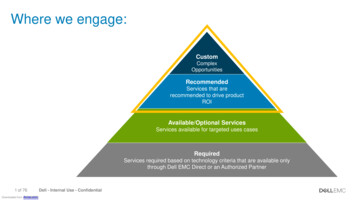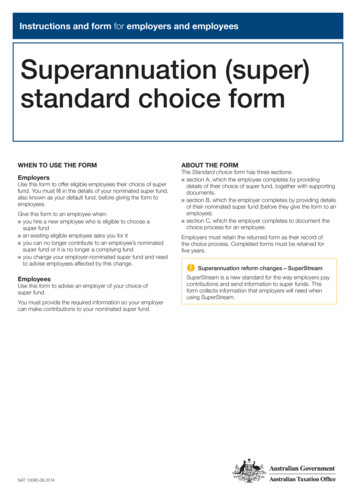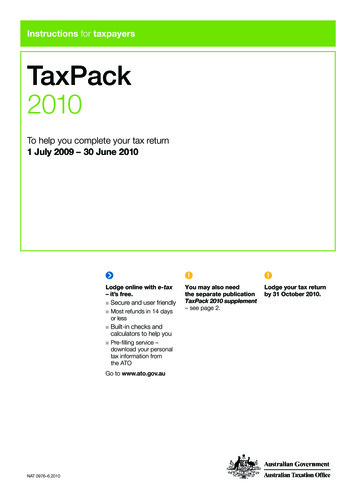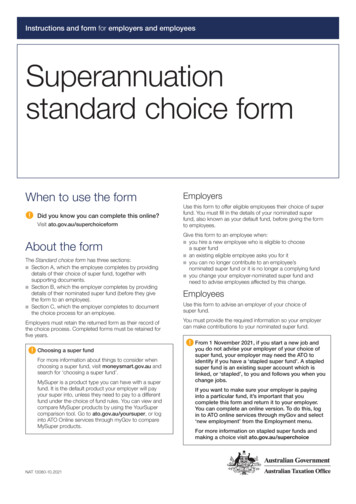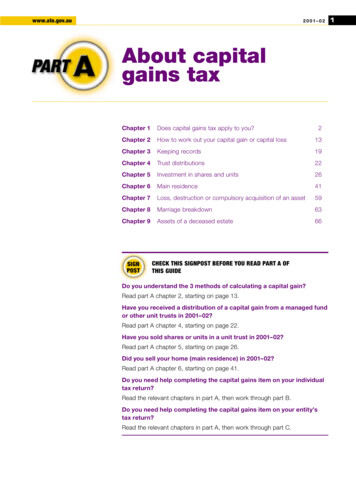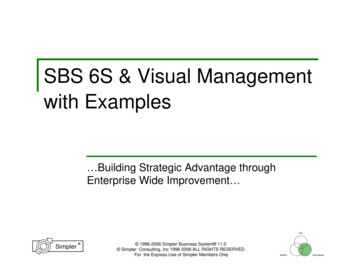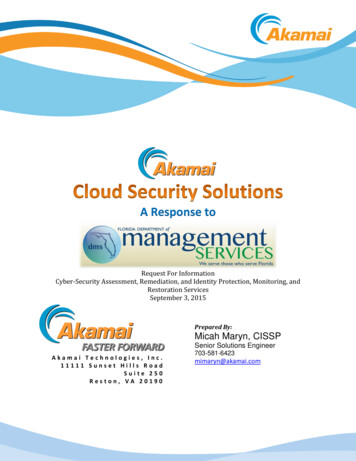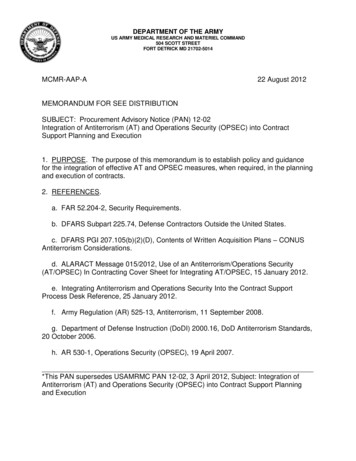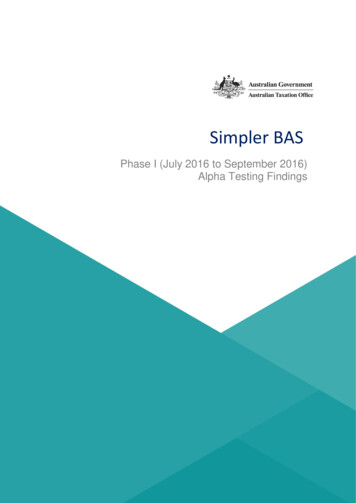
Transcription
Simpler BASPhase I (July 2016 to September 2016)Alpha Testing FindingsUNCLASSIFIED EXTERNAL1
Executive summarySmall business, software developers and tax professionals have raised concerns that the complexity of the BASplaces an unnecessary burden on small business and increases their GST compliance costs.The ATO has partnered with software developers, small business and tax professional associations to fullyunderstand the underlying drivers for compliance costs and co-design an enhanced GST bookkeeping andreporting experience for small businesses.Expressions of interest were sought from software developers via the Software Industry Partnership Office (SIPO)landing page to test the Simpler BAS digital bookkeeping experience during 2016-17. MYOB, Reckon, Intuit andSage accepted this offer to partner with the ATO during the testing phase.The Phase 1 Alpha testing report outlines the preliminary perceptions about Simpler BAS from tax professionaland small business participants. The report also outlines key findings and recommendations that softwaredevelopers would need to consider should they update their software to offer Simpler BAS bookkeeping features.What is Simpler BAS?From 1 July 2017, Simpler BAS will be the default GST reporting method for 2.7m small businesses. Smallbusinesses will only be required to report: 1A GST collected1B GST entitled to be claimedG1 total salesSimpler BAS is a digital service offer in partnership with accounting software developers to reduce GST reportingrequirements and make digital bookkeeping solutions easier, quicker and simpler to use for small business.Simpler BAS is expected to deliver approx. 130m per annum in time and cost savings to small businesses.Intent of Alpha testing phasesAlpha testing will be conducted with up to 2,000 small businesses to ensure a seamless transition for the broader2.7m small businesses from 1 July 2017.Alpha testing will be conducted over four phases throughout 2016-17 with the intent of each phase as outlinedbelow.Phase 1 (July 16 – Sept 16) Test the manually re-configured accounting software to identify system constraints and design issuesthat will impact on the Simpler BAS digital bookkeeping experience.Co-design an enhanced end user experience through software enhancements with participating softwaredeveloper partners and a team of tax professionals who are also software certified consultants.Surface the initial perceptions of the Simpler BAS bookkeeping solution.Phase 2 (Oct 2016 – Dec 2016) ATO to provide Simpler BAS system specifications and incorporate Phase 1 Alpha testing findings intothe detailed co-design activities with software developer partners.Phase 3 (Jan 2017 – Mar 2017)) Test and fully understand the Simpler BAS bookkeeping and GST reporting experience with newlyregistered GST businesses.Phase 4 (Apr 2017 – June 2017) Test our software developer partners’ updated digital accounting solutions with up to 2,000 smallbusinesses.Measure the time, cost and stress savings of the new Simpler BAS digital bookkeeping solution.UNCLASSIFIEDEXTERNAL2
Scope of Phase 1The scope of the Phase 1 Alpha testing participants included: 192 Small business and 13 Tax professionalparticipants (BAS and tax agents who are software certified consultants).The expansion of testing participants during Phases 2 – 4 will be guided by our software developer partners’timelines for updating their accounting software. This will ensure we are testing the fully automated SimplerBAS bookkeeping solutions that will be available to the broader 2.7m small businesses from 1 July 17.Our software developer partners have indicated that the expansion up to 2,000 small business participants isnot expected until Phase 4 (ie Apr 2017 to Jun 2017) due to: Scope of the system impacts identified in Phase 1 andATO’s Simpler BAS system specifications have not been available to date.Preliminary insights into Simpler BAS effectiveness measuresThe ATO has developed a suite of effectiveness measures to ensure that the Simpler BAS delivers on theintended benefits for small businesses.The following preliminary insights provide an early indication of the perceptions held by tax professionals andsmall business participants about Simpler BAS. These insights are based on 29 observation sessions with taxprofessional and small business participants during their setup, bookkeeping and BAS preparation stages.The ATO will re-visit these perceptions in Phase 4 with the expansion up to 2,000 small business participantsand a statistically relevant survey methodology. This will produce reliable effectiveness measurementsrepresentative of the broader 2.7m small business for the time, cost and stress benefits of Simpler BAS.Effectiveness measure 1 - Reduced GST Compliance costs Perception of tax practitioners and small business participants was that Simpler BAS would make itquicker, easier and reduce the cost of compliance for GST. The fees that tax professionals charge for bookkeeping and BAS preparation would remain unchanged,however less time would be spent on transactional level validation checks and form filling with anincreased focus on providing commercial services for clients. Concerns have been expressed by participants about transitional costs associated with manually reconfiguring their GST settings in accounting software. Manual re-configuration would be too complex forsmall businesses and also a timely, expensive service for tax professionals to provide.Effectiveness measure 2 - Increased confidence by businesses in managing their GST obligations Reduced GST tax codes are producing more accurate classifications of transactions with on-goingbookkeeping. This was evidenced by a reduction in the number of transactions requiring validationcheck adjustments by tax professionals at the BAS preparation stage. Small businesses and tax practitioners want to retain control of their bookkeeping solutions. Updating toSimpler BAS GST settings should be an optional election. The re-configuration process should alsoretain the tailored automation settings that small business has invested in setting up.Effectiveness measure 3 - Decreased complexity in managing GST obligations Tax practitioner participants would recommend the majority of their clients adopt the Simpler BAS GSTsettings, with the exception of their most complex clients that would utilise additional tax codes. Non-software participants saw little to no change to bookkeeping as they currently don’t report (or needto) all GST information on their BAS. Perceptions of additional complexity and cost were the keyreasons given by small businesses for not yet transitioning to a digital bookkeeping solution.Effectiveness measure 4 – Support software developers to simplify digital GST bookkeeping solutions ATO detailed specs, phase 1 Alpha findings and co-design support will make it easier for softwaredevelopers to simplify digital GST bookkeeping solutions and maximise benefits to small business.UNCLASSIFIEDEXTERNAL3
Key recommendationsThe ATO should continue Alpha testing throughout the remainder of 2016-17 to validate and quantify thepreliminary findings with a statistically valid sample of participants.Generic findings should be provided to the broader software developer community, small business and taxprofessional associations to ensure alignment of transitional support products and services.The ATO will need to work closely with our software developer and tax professional partners to ensurealignment of communications, support products and services during the transitional period for Simpler BAS.This leveraged approach will ensure that the transitional complexities identified in Phase 1 are eliminated andsmall businesses are fully supported in a seamless transition of their GST bookkeeping solution.Software developers designing an enhanced Simpler BAS digital bookkeeping experience for end users mayconsider the following software constraints, design issues and potential system changes identified in the Phase1 Alpha testing: Providing an option to elect to use Simpler BAS tax code settings or retain more complex tax codesettings.Functionality to add new tax codes that map to both sales and expenses.Old tax codes should be made inactive to avoid unnecessary end user complexity.New tax codes will need to map to the reduced BAS output (ie G1, 1A & 1B) and the GST worksheetwill no longer be required.Source G1 total sales figure from the Chart of Accounts (CoA) to avoid the need for a third GST taxcode for BAS exempt transactions (eg private, dividends, grants).Ability to manually override the GST amount for mixed invoices if this is fixed at 1/11 of thetransaction amount. This feature would allow end users to enter mixed invoices as a single line entrysaving time on data entry.Provide an automated process for existing businesses to update their tailored GST settings shouldthey elect to use Simpler BAS settings (eg default tax codes for CoA, suppliers, customers, items andbank feed rules).Small businesses and tax professionals will need to be notified of the Simpler BAS updates to accountingsoftware products, new features available and system guidance provided on how to re-configure to the SimplerBAS settings.Consideration should be given to adopting an industry standard for binary GST tax codes (eg GST yes or no).The Australian Business Software Industry Association (ABSIA) is forming a special interest working group toconsider the future integration and automation opportunities that an industry standard would deliver. TheABSIA Special Interest Working Group will also shape the final detailed system design for Simpler BAS. Toparticipate in the ABSIA Special Interest Working Group software developers can contact Australian BusinessSoftware Industry Association (ABSIA)Software developers considering providing the enhanced Simpler BAS bookkeeping features to their end userscan subscribe to ATO’s Software developer newsletter for Simpler BAS updates. Impacted softwaredevelopers can also contact the Simpler BAS project team directly at SimplerBAS@ato.gov.au.Tax professionals will play a pivotal role in supporting small businesses through the Simpler BAS transitionperiod, particularly with any impacts on their bookkeeping practices.Tax professionals may consider following the ATO’s Simpler BAS communications, support products andservices via their tax professional associations to ensure they can fully support small businesses with: UNCLASSIFIEDDeciding whether Simpler BAS accounting software settings are appropriate for their business.Re-configuring their GST settings in their accounting software to ensure that any tailored automationrules are not lost.Getting the most out of Simper BAS accounting software updates features provided by their clients’accounting software providers.Encouraging the use of existing and enhanced automation features provided by their clients’ softwaresolutions.EXTERNAL4
MethodologyWhat is the Simpler BAS trial?The ATO has partnered with MYOB, Intuit, Reckon and Sage to trial the Simpler BAS bookkeeping and reportingsolution throughout 2016-17.The first phase of the trial, which began in July 2016, is focused on discovering system constraints and designissues that will impact on the Simpler BAS digital bookkeeping experience. As the trial continues and moreparticipants are added, the focus will move to measuring the perception change and cost of compliance impacts.Phase 1 & 2 participant demographicsAll small business participants met the current eligibility criteria for the trial: less than 10 million turnover reporting GST quarterly and using GST full reporting method and for accounting software users, an authorised product from a software partnerTable 1. Small business participant demographics (Total 192)AccountingSystemEntity Type148Paper/Excel44 Accounting software72464Sole TradersSuperannuation FundAccommodation/FoodAdmin & SupportServicesAgricultureArts & RecreationChurch/ReligionConstructionFinancial ServicesQueenslandWestern AustraliaNorthern cation and TrainingHealth careInformation Media &TelecommunicationsManufacturingProfessional, Scientific &TechnologyNew South WalesSouth l, Hiring & RealEstate ServicesRetailTransport, Postal &WarehousingWholesale TradeSuperannuation FundOtherVictoriaTasmania4Unknown810Table 2. Tax professional participants demographics (Total 13)Participant RoleSoftware providerStateRegional/Metro5631111Tax agentsIntuitSageOneQueenslandWestern AustraliaMetropolitan82BAS agent / BookkeeperMYOB2 Reckon512New South WalesSouth AustraliaRegional5 VictoriaResearch methodologyThe research planned to be undertaken throughout the trial uses a mixed methodology. Software developerpartners are sourcing digital accounting software participants and the ATO has been directly sourcing participantsthat use manual bookkeeping solutions.Phase 1 research methodology relied heavily on face to face observation sessions at the business premisesduring the set up, bookkeeping and BAS preparation stages.Phases 2, 3 and 4 will introduce the use of a baseline survey that will track and measure changes in participant’sperceptions as well as the impact on time, cost and stress associated with GST reporting.UNCLASSIFIEDEXTERNAL5
Detailed Findings and Recommendations1. Accounting software usersWe ran 14 observation sessions with tax professionals, who are software certified consultants for our foursoftware developer partners. These sessions allowed us to capture the following detailed findings andrecommendations during the setup, bookkeeping and BAS preparation stages.Detailed findings1The perception was Simpler BAS would make it quicker,easier and reduce the cost of compliance for them andtheir clients. However, the actual fee charged would notchange. Any extra time would result in additionalcommercial services for clients.Using Simpler BAS, businesses would only need to consider ifa transaction has GST yes or no. The different reasons atransaction was 10% or 0% would not need to be captured withadditional tax codes. The invoice would still be retained as theunderlying justification as to why a transaction attracted GST ornot. The multiple 0% and 10% tax codes were creatingconfusion for small business end users of accounting software.Initial reports from tax professionals is that their clients had anincreased understanding and confidence while doingbookkeeping for their BAS which was resulting in increaseddata accuracy and fewer misclassifications.Tax professionals indicated that whilst they would convert themajority of their clients onto the new Simpler BAS tax codesthey would continue to use the additional tax codes for a smallnumber of clients with complex tax affairs (eg clients with inputtaxed sales/supplies).Tax professionals found that Simpler BAS would reduce thetime taken to do validation checks. They could ignore the ‘novalue added’ checks, (i.e. the 0% to 0% or 10% to 10%) andonly focus on the ’value added’ checks (i.e. 10% to 0% or otherfinancial validation checks).2Existing small businesses will require their tailored GSTautomation settings updated. Manual re-configuration ofaccounting software is complex and time consuming.Approximately 69% of businesses use accounting software. Ourresearch found GST reporting on the BAS was not as simple asjust pressing a button. Businesses that use accounting softwareneed to configure their system so that it is tailored to theirbusiness. This involves paying tax professionals to set up theaccounts and GST automation rules. For new businesses the setup of their GST settings using the reduced Simpler BAS tax codeswill be relatively straight forward. However, existing businessesthat have already invested in setting up tailored GST settingswould find re-configuration too challenging without tax professionalassistance.RecommendationsThe ATO to continue Alpha testingthroughout the remainder of 2016-17 tomeasure the preliminary perceptionsthat Simpler BAS is quicker, easier andwill reduce compliance costs with astatistically valid sample of participants.Software developers to consideroffering their users an optional electionto use Simpler BAS tax code settings orretain more complex settings.Software developers to consideradopting the new binary GST tax codes(ie GST yes or no) that is currentlyunder consideration by the ABSIAspecial interest working group as anindustry standard to drive futureintegration and automation acrossdigital platforms.Tax professionals to consider thebroader commercial services that theycan provide to businesses as the focuson manual data entry and form filling isreduced.Software developers to provide anautomated process to update tailoredGST settings for existing businessesthat elect to use Simpler BAS settings(eg default tax codes for chart ofaccount (CoA), suppliers, customers,items and bank feed rules).Tax professionals to consider whetherit is practical and/or economical forclients using software that does notsupport auto re-configured Simpler BASsolution to update their GST settings(eg non-supported desktop products).The manual reconfiguration process that our tax professionalUNCLASSIFIEDEXTERNAL6
Detailed findingsRecommendationsparticipants had to navigate included the following steps: Adding new tax codes for Simpler BAS. Making old codes inactive. Mapping the new codes to both sales and expenses. Mapping the new codes to BAS outputs. Updating default GST tax codes for - Chart of Accounts(CoA), customers, suppliers, items, bank rules, andmemorised transactions. Currently, re-configuration involves a timely, manualprocess and / or utilising an export / import function thatdoes not update all default GST tax codes (eg bank rulescannot be exported or imported).It would be too complex for a small business to manually reconfigure their accounting software themselves and having topay a tax practitioner would be a barrier to adopting the newSimpler BAS bookkeeping solution.3Small businesses and tax practitioners want to retaincontrol of their bookkeeping solution.Small businesses have invested in tailoring their GSTbookkeeping settings to provide a degree of automation. Anychanges to their GST settings should not be an automaticupdate that would result in the loss of these settings. Smallbusinesses expect to be able to retain their automated settingsif they elect to use Simpler BAS in their accounting software.Tax practitioner participants would recommend Simpler BASGST tax code settings to be used by the majority of theirclients.Software developers to provide theoption to existing businesses to stay ontheir current GST settings or elect to reconfigure to the Simpler BAS tax codesettings.Software developers to considerproviding an automated re-configurationtool for businesses that elect to use theSimpler BAS tax code settings so thatthey can retain their tailored automationrules.Tax professionals to consider which oftheir clients should transition to SimplerBAS bookkeeping settings based onthe complexity of their tax affairs.4Total sales (G1) if sourced from the CoA, will need to bemapped to various sub-accounts.The option of sourcing total sales from the CoA will eliminatethe need for an additional ‘0%’ tax code.Multiple ‘0%’ tax codes was identified as a source of confusionand impacted on data accuracy.BAS exempt transactions (eg private, dividends, wages etc.)cannot use the GST no tax code as it needs to be isolated froma client's G1 total sales.An alternative approach of sourcing G1 from the CoA wastested with several tax professionals and shown to produceaccurate results and eliminate the need for an additional 0%tax code that could create confusion.Software developers to considersourcing G1 total sales figure from theCoA to avoid the need for a third GSTtax code for BAS exempt transactions.G1 can be derived from various incomesub-accounts. A software basedsolution would be required to ensureG1: Includes the full amount fromsales of Plant and Equipment. Excludes dividend and grantincome.If a business uses the cash accountingmethod, software can produce a cashbased Profit & Loss or a worksheet toconvert accruals to cash.Minor manual adjustments to the G1 figure was required toaccount for plant and equipment, dividends and grant income.UNCLASSIFIEDEXTERNAL7
Detailed findings5Conversion of data files to the new Simpler BAS GST taxcode settings might mean the historical coding will be lost.Participants were concerned with how conversion to SimplerBAS would affect coding of historical transactions. Oncetransitioned over to Simpler BAS, software users may not beable to provide the full range of GST questions currently on theBAS. This would prevent the lodgment of BAS for periods priorto 1 July 2017.During the observations, entering transactions using SimplerBAS coding went smoothly for new transactions. Re-occurringtransactions continued to pick up the old codes, preventingdata being correctly mapped to the BAS. No error messagewas displayed in these instances to alert users to change to thenew codes.RecommendationsThe ATO to provide flexibility for smallbusinesses to lodge BAS for periodsprior to 1 July 2017 without G2, G3,G10 & G11.Software developers to consider theappropriate software solution thatminimises the impact on historicalcoding (eg de-activating old tax codes).Tax professionals to consider closingoff client’s journals prior to conversionto Simpler BAS. This would potentiallyeliminate unintended consequencesduring conversion. However this maynot be the most practical solution.Tax professional participants indicated a preference forretaining any coding on historical transactions, where possible.6Minor enhancements to the GST detailed report will assistidentification of capital misclassifications and enhance theintegrity of the business data.Concerns were raised about how tax professionals can checkthe misclassification of capital purchases without dedicatedcapital/non-capital tax codes. If their clients have allocated theircapital purchases incorrectly, it won’t affect the accuracy of theBAS preparation. However, at the end of the year, the taxagent will need to spend additional time in correcting this forthe income tax return.Software developers to consideradding an “account” column in the GSTdetailed report to enhance thevalidation check process for taxprofessionals.Tax professionals to consider usingenhanced detailed GST report toidentify and correct capitalmisclassifications using the sourceaccount.Adding the source of account in the GST detailed report wouldenable the tax professional to identify and correct capitalmisclassifications whilst preparing the client’s BAS. This wouldenhance validation checks for tax professionals over thecurrent practice with unreliable tax codes.7Businesses are not fully maximising existing automationfeatures.While bank feeds assist with automation for the user, there areperceptions about the reliability of the data transfers from theirbank account into the accounting software. This places a heavyimportance on manually reconciling the bank account/s tomaintain accuracy which takes time. Reliability issues include: Incomplete transactions.Duplication of transactions.Timing issues with payment status.Timing issues were also identified for bulk payments using anautomatic Australian Bankers’ Association (ABA) with 2-3 daytime lags.Usage of third party app add-ons to automatically captureinvoices and eliminate manual data entry was not widely used.The primary reason for not using automatic invoice captureUNCLASSIFIEDEXTERNALSoftware developers to considermarketing the automation featuresprovided by digital accounting softwarein alignment with the Digital by Defaulttransition period (ie July 2017 – Jun2018). Digital by Default will requirebusinesses lodging a paper BAS totransition to digital lodgment unlessthey are in an exemption category.Software developers to consider theprice sensitivity for small businesseswhen rolling out Simpler BAS updates.If Simpler BAS updates are rolled outfree of charge (as part ongoing cloudsubscription fees) this would maximisethe penetration of benefits to smallbusinesses.8
Detailed findingssoftware was the pricing structure per transaction and the factthat small businesses have high volume and low valuetransactions.RecommendationsATO to engage with financialinstitutions, software developers andtax professionals to explore the positivebenefits that the New Payment Platform(NPP) will have on the timing issuesrelated to bank feeds.Tax Professionals to consider advisingand supporting clients to get the mostout of the automation features providedby their accounting software.8Software products required system changes to facilitateSimpler BAS.There were varying degrees of manual configuration flexibilityacross the different software products tested.Tax professional participants that are also software consultantsfor the software developer partners identified a range ofsoftware updates that would be required to deliver anenhanced Simpler BAS end user experience.If adopted, these system updates would make bookkeepingsimpler for users and enhance the validation processes for taxprofessionals.9Feedback on the Simpler BAS communication productsused in the trial was mixed and further work from the ATOis required to ensure that they are appropriate for a smallbusiness audience.The ATO provided the following support products and servicesto assist Alpha testing participants: E-mail correspondence explaining what Simpler BAS isand how to participate in the Alpha testing.Simpler BAS on-line guide.Webinars for tax professionals.Priority call centre support line.Small business feedback was clear that the terminology andcomplexity of the ATO’s correspondence and on-line contentUNCLASSIFIEDEXTERNALSoftware developers to consider thefollowing system updates if providing aSimpler BAS bookkeeping solution: Add new tax codes or use existingtax codes for Simpler BAS. Make old codes inactive. Map one tax code to both sales andexpenses. Re-design the BAS outputs. Map the Simpler BAS codes to thenew BAS outputs. Manually override GST amounts formixed supplies. Have an automated process toupdate client’s files (customers,suppliers, items, bank rules, CoAand memorised transactions) toSimpler BAS settings. Allow their users to stay on theircurrent settings or move to SimplerBAS settings. Add an “account” column in theGST detailed report. Support prior period accounts ifthey are not closed off prior toconversion to Simpler BAS. Source Total sales (G1) from theCoA.The ATO will incorporate feedbackfrom Alpha testing participants into thedraft Simpler BAS communicationsproducts. Feedback to date hashighlighted the need to test our keymessages with small business and taxprofessional associations prior to theSimpler BAS communicationscampaign commencing in Mar 2017.Software developers rolling outSimpler BAS updates should considerdeveloping guides to support smallbusinesses and their advisors to helpconfigure their accounting systems for9
Detailed findingswas too long and too confusing.RecommendationsSimpler BAS.The tax practitioner webinars were well received and assistedtax professionals with the set up process.In addition to the ATO support products and services oursoftware developer partners provided Simpler BAS systemguides that again assisted with the complexity of the manualre-configuration process.The ATO partnered with the Institute of Certified Bookkeepersto developer a Simpler BAS bookkeeping guide that receivedextremely positive feedback from both tax professionals andsmall businesses in terms of set up and on-going bookkeeping.2. Non-software usersWe ran sessions with 15 small businesses using paper and/or excel based bookkeeping solutions. Thesesessions allowed us to observe and discuss things that came up during the setup, bookkeeping and BASpreparation stages.Findings9Non-software participants saw little or no change tobookkeeping as they currently don’t report all GSTinformation on their BAS.While interested in Simpler BAS, initial concerns were that thischange may entail additional expenses and/or time to changethe way they manually keep their books.RecommendationsThe ATO to continue Alpha testing withnon-software participants in Quarter 2with a statistically valid sample tomeasure the preliminary perceptionsthat Simpler BAS has little to no impacton non-software bookkeeping practices.Most non-software participants were either oblivious to theneed to report the additional GST information or did not havetransactions of this nature. Once informed that they wereactually required to report this information they were relievedthat Simpler BAS would allow them to continue to use theircurrent bookkeeping practices.After experiencing Simpler BAS for a full quarter, they sawminimal or no change to their existing bookkeeping processes.We asked the non-software participants their opinions of theimpacts that Simpler BAS would have on compliance costs,complexity and confidence. Although there was little to nochange in their bookkeeping process, they all agreed in beingmore confident in managing their own GST obligations.The majority indicated no adverse impact to their businesswhilst some stated that Simpler BAS would make it easier andprovide time savings.10Perceptions that digital bookkeeping was too complexand/or costly for their business.The non-software user group preferred a simple two-accountbookkeeping system that only records sales and expenses.Instead of tax codes they simply recorded the relevant GSTamount where GST was applicable.UNCLASSIFIEDEXTERNALThe ATO and software developersshould seek to align communications topromote digital bookkeeping as ameans to minimise compliance costsa
landing page to test the Simpler BAS digital bookkeeping experience during 2016-17. MYOB, Reckon, Intuit and Sage accepted this offer to partner with the ATO during the testing phase. The Phase 1 Alpha testing report outlines the preliminary perceptions about Simpler BAS from tax professional and small business participants.
